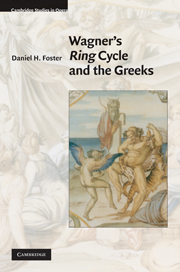Book contents
- Frontmatter
- Contents
- List of musical examples
- Preface
- Acknowledgments
- Introduction
- Part I Epic
- Part II Lyric
- Part III Drama
- Epilogue: Time, the Ring, and Performance Studies
- Appendices: Wagner's primary and secondary sources
- Appendix A Wagner's primary sources
- Appendix B Secondary scholarship by authors Wagner knew personally
- Appendix C Secondary scholarship by authors Wagner knew by reputation or by reading
- Notes
- Bibliography
- Index
Appendix C - Secondary scholarship by authors Wagner knew by reputation or by reading
from Appendices: Wagner's primary and secondary sources
Published online by Cambridge University Press: 07 May 2010
- Frontmatter
- Contents
- List of musical examples
- Preface
- Acknowledgments
- Introduction
- Part I Epic
- Part II Lyric
- Part III Drama
- Epilogue: Time, the Ring, and Performance Studies
- Appendices: Wagner's primary and secondary sources
- Appendix A Wagner's primary sources
- Appendix B Secondary scholarship by authors Wagner knew personally
- Appendix C Secondary scholarship by authors Wagner knew by reputation or by reading
- Notes
- Bibliography
- Index
Summary
Not surprisingly, the list of secondary authors that one can prove Wagner knew personally is shorter than the list of those secondary authors that he knew only by reputation or by reading their work. Several of the scholars in this second category merit special attention because (1) their works could be found both in Wagner's Dresden library and his Wahnfried library, and (2) they are mentioned often by Cosima in her diaries and/or by Wagner in his own writings. The two most important authors in this respect are Johann Gustav Droysen and Karl Otfried Müller and so I will dwell at length on them and their work, especially Müller's Dorians (Die Dorier), Droysen's History of Hellenism (Geschichte des Hellenismus), and his translation of Aeschylus. In general, though, it is interesting to note that two of these works focus neither on Athens at its most fertile historical moment nor on its most important civic art, tragedy. Instead, Droysen's Hellenism focuses on Athens after its classical period, while Müller's Dorians focuses on that culture that, in so many ways, stood against all that Athens stood for. As I argue throughout this book (but especially in the sections on Götterdämmerung), Wagner was always intrigued by destruction and doom (Untergang) and by what a thing was not rather than what it was.
- Type
- Chapter
- Information
- Wagner's Ring Cycle and the Greeks , pp. 284 - 294Publisher: Cambridge University PressPrint publication year: 2010



